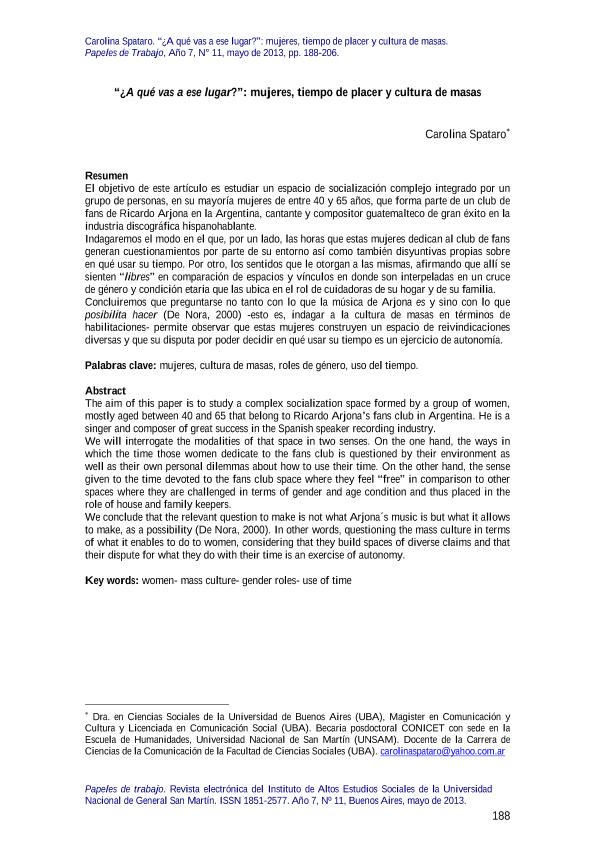Artículo
El objetivo de este artículo es estudiar un espacio de socialización complejo integrado por un grupo de personas, en su mayoría mujeres de entre 40 y 65 años, que forma parte de un club de fans de Ricardo Arjona en la Argentina, cantante y compositor guatemalteco de gran éxito en la industria discográfica hispanohablante. Indagaremos el modo en el que, por un lado, las horas que estas mujeres dedican al club de fans generan cuestionamientos por parte de su entorno así como también disyuntivas propias sobre en qué usar su tiempo. Por otro, los sentidos que le otorgan a las mismas, afirmando que allí se sienten “libres” en comparación de espacios y vínculos en donde son interpeladas en un cruce de género y condición etaria que las ubica en el rol de cuidadoras de su hogar y de su familia. Concluiremos que preguntarse no tanto con lo que la música de Arjona es y sino con lo que posibilita hacer (De Nora, 2000) -esto es, indagar a la cultura de masas en términos de habilitaciones- permite observar que estas mujeres construyen un espacio de reivindicaciones diversas y que su disputa por poder decidir en qué usar su tiempo es un ejercicio de autonomía. The aim of this paper is to study a complex socialization space formed by a group of women, mostly aged between 40 and 65 that belong to Ricardo Arjona’s fans club in Argentina. He is a singer and composer of great success in the Spanish speaker recording industry. We will interrogate the modalities of that space in two senses. On the one hand, the ways in which the time those women dedicate to the fans club is questioned by their environment as well as their own personal dilemmas about how to use their time. On the other hand, the sense given to the time devoted to the fans club space where they feel “free” in comparison to other spaces where they are challenged in terms of gender and age condition and thus placed in the role of house and family keepers. We conclude that the relevant question to make is not what Arjona´s music is but what it allows to make, as a possibility (De Nora, 2000). In other words, questioning the mass culture in terms of what it enables to do to women, considering that they build spaces of diverse claims and that their dispute for what they do with their time is an exercise of autonomy.
¿A qué vas a ese lugar?: mujeres, tiempo de placer y cultura de masas
Fecha de publicación:
05/2013
Editorial:
Universidad de San Martín. Instituto de Altos Estudios Sociales
Revista:
Papeles de Trabajo
ISSN:
1851 2577
Idioma:
Español
Tipo de recurso:
Artículo publicado
Clasificación temática:
Resumen
Palabras clave:
Mujeres
,
Música
,
Ocio
,
Placer
,
Cultura de Masas
,
Roles de Género
,
Uso del Tiempo
Archivos asociados
Licencia
Identificadores
Colecciones
Articulos(SEDE CENTRAL)
Articulos de SEDE CENTRAL
Articulos de SEDE CENTRAL
Citación
Spataro, Carolina; ¿A qué vas a ese lugar?: mujeres, tiempo de placer y cultura de masas; Universidad de San Martín. Instituto de Altos Estudios Sociales; Papeles de Trabajo; 7; 11; 5-2013; 188-206
Compartir




